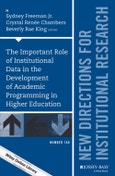- various types of academic programing (i.e. academic degrees, research centers/institutes),
- diverse institutional types including community colleges, doctoral/research universities, minority-serving and for-profit institutions, and
- concrete examples and steps regarding how to utilize institutional data to improve academic planning and development.
This is the 168th volume of this Jossey-Bass quarterly report series. Timely and comprehensive, New Directions for Institutional Research provides planners and administrators in all types of academic institutions with guidelines in such areas as resource coordination, information analysis, program evaluation, and institutional management.
Table of Contents
EDITORS’ NOTES 7
Sydney Freeman, Jr., Crystal Renée Chambers, Beverly Rae King
1. Understanding the Organizational Context of Academic Program Development 9
Jay R. Dee, William A. Heineman
This chapter provides a conceptual model that academic leaders can use to navigate the complex, and often contentious, organizational terrain of academic program development. The model includes concepts related to the institution’s external environment, as well as internal organizational structures, cultures, and politics. Drawing from the literature in management, organizational studies, and higher education, this chapter explains how various organizational configurations lead to different assumptions and practices regarding data use and program development decisions. These assumptions and practices are illustrated through a case study of the development of online programs in a community college system.
2. Developing Distinctive Degrees 37
Lester F. Goodchild, Crystal Renée Chambers, Sydney Freeman, Jr.
Linking strategic planning and competitive strategy in doing local and regional degree scanning provides campus planners and leaders with information to create unique degree programs. This chapter offers a theoretical exploration of key terms, how institutional strategy and strategic planning interrelate, and what role strategic degree scanning can play in this activity. Case studies from the University of Denver, Santa Clara University, and Iowa State University point to how this developing idea and practice work.
3. Developmental, Remedial, and Basic Skills: Diverse Programs and Approaches at Community Colleges 49
Linda Serra Hagedorn, Inna Kuznetsova
The nation’s community colleges and their general open-door access serve a large number of students who must first enroll in remedial level instruction in English, mathematics, and/or reading prior to enrolling in college-level coursework. Some colleges embed remedial or developmental instruction within the disciplines, such as English and mathematics. Others create a new department or structure, which may go by various names, such as Student Success or Basic Instruction. This chapter explores the variations of programs established for developmental students and how institutional research can help as a partner identifying practices that work.
4. Establishing a Research Center: The Minority Male Community College Collaborative (M2C3) 65
J. Luke Wood, Marissa Vasquez Urias, Frank Harris III
This chapter describes the establishment of the Minority Male Community College Collaborative (M2C3), a research center at San Diego State University. M2C3 partners with community colleges across the United States to enhance access, achievement, and success among men of color. Throughout the chapter, the authors focus on the role of data in informing the efforts undertaken to establish the center.
5. Higher Education Leadership Graduate Program Development 79
Sydney Freeman, Jr., Crystal Renée Chambers, Rochelle Newton
Combined public and private spending on higher education in the United States is nearly double that of other Organization for Economic Cooperation and Development (OECD) nations; yet measures of institutional productivity, such as graduation rates, are not as high as many of our international peers, suggesting that perhaps we are not getting as much bang for our buck. Higher education graduate programs are generally purposed to develop practitioners and researchers dedicated to the study, leadership, and management of higher education institutions. In this chapter, the authors use the Lattuca and Stark (2009) model of curriculum as an academic plan to connect strategic and academic planning for higher education graduate programs.
6. An Academic Innovation: The Executive Ph.D. in Urban Higher Education at a Historically Black University 91
Joseph Martin Stevenson, Alfredda Hunt Payne
The Executive Ph.D. (EPhD) in Urban Higher Education celebrated its 10th anniversary at Jackson State University in December of 2014. The EPhD program is considered one of the most innovative program development initiatives in the historically black college and university (HBCU) sector. The program has trained and graduated over 200 alumni who are serving in leadership positions all over the country. This chapter will chronicle the historical context of the EPhD program from state funding designed to desegregate higher education and promote equitable resource allocation. The chapter will discuss the extensive strategic planning of the program as related to the urban mission of Jackson State University as facilitated by institutional research.
7. Making the Connections Across Institutional Types and Academic Programs: Recommendations for Institutional Research Practice and Future Research 101
Beverly Rae King
This final chapter sheds light on the ways in which institutional research (IR) professionals can be involved in the development and/or modification of high-quality academic programs. Suggestions from authors within this volume for how IR can assist in accomplishing these goals are integrated and organized in alignment with Terenzini’s (1993) three tiers of organizational intelligence.
INDEX 107








